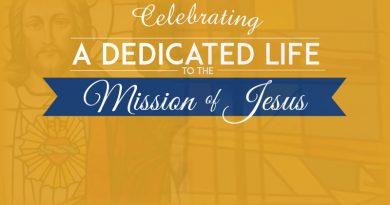Study day focuses on vocations; survey data says family is key
By Dan Russo
Witness Editor
WATERLOO — How can we best live the vocation to which God is calling us and help others to do the same?
Participants in the latest Pastoral Leadership Study Day, held Oct. 16 at the Five Sullivan Brothers Center in Waterloo, delved deeply into these questions. The theme of the event that drew about 200 people was “Promoting Vocations in General and Priesthood in Particular” — one of the four mission priorities of the archdiocese. Archbishop Jackels started the day by defining “vocation,” which comes from the Latin word “to call” or “to invite.”
“In our regular English usage, the word vocation, we think it in terms of a job,” said the archbishop. “In the church we use it almost exclusively to refer to God’s call for each of us to be something and because of it to do something or go somewhere. It is an invitation. Everyone is free to say yes or no to whatever that vocation is.”
The archbishop defined four principal vocations everyone has: a call to heaven, to strive for holiness, to support the church’s mission, and to a particular state in life. That “state” can mean marriage, dedicated single life, the diaconate, religious life or priesthood.
“Each of us is challenged to know God’s plan, to say yes to it, and then to live it as best we can,” said Archbishop Jackels. “The pay off is motive enough. The pay off is that this creates the greatest potential for us to make the world different and better just by living that vocation in service of another and others. But also it is the source of the greatest happiness or fulfillment that we can enjoy in this life and preparing us for the perfection, the completion of happiness in heaven.”
When it comes to vocations, the lynchpin for everyone is the family, according to Kevin Feyen, director of adolescent and young adult faith formation for the archdiocese. Feyen gave an overview of two surveys conducted in preparation for the Vatican’s synod on young people, the faith and vocational discernment, which is happening now in Rome. His office asked questions of about 1,200 young people ages 16-29 and sent a second questionnaire to people 30 and over about their experiences with the church.
“If there was one pivotal correlation that affected everything, it’s the family,” said Feyen.
Results showed that the more strongly a family was involved in the faith, the more likely it was that children were active in the church and had considered vocations of all kinds (See chart below). For example, of the young men who have had 16 or more faith experiences, 100 percent of them have considered the priesthood. Feyen concluded that the programs the church offers are having a positive impact, but there is a problem engaging males.
“We see that our male participation in all of these experiences is one-half the female participation rate,” he said.
Feyen explained that when reaching out to young people, adults must take Pope Francis’ advice to “smell like the sheep” by engaging them where they are and listening to what they have to say.
“(They’re saying) just listen to us,” said Feyen. “I don’t think listen means change church teaching. It means try to get where I’m coming from, because then you can engage me better. We need to listen so we can talk better. They want us to care about them.”
Father Jon Seda, vocations director for the archdiocese, also offered his thoughts on vocational discernment as part of the day. He said anyone seeking to know God’s call should ask three questions: What do others see in me? What makes me feel most alive? And where am I needed?
“Vocational discernment is important so we do not live a mediocre, bland life,” reflected Father Seda. “Living with passion and purpose is the goal of vocational discernment. When we do God’s will, our lives are meaningful and bear good fruit for the Kingdom of God.”

Michael McAndrew (left), a transitional deacon who will be ordained a priest for the Archdiocese of Dubuque next year, walks with his parents, Marta and Matthew, during their recent visit to Mundelein Seminary in Illinois. (Photo courtesy of Mundelein Seminary)



